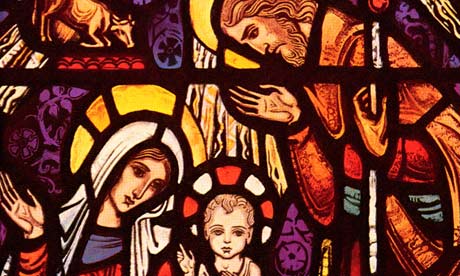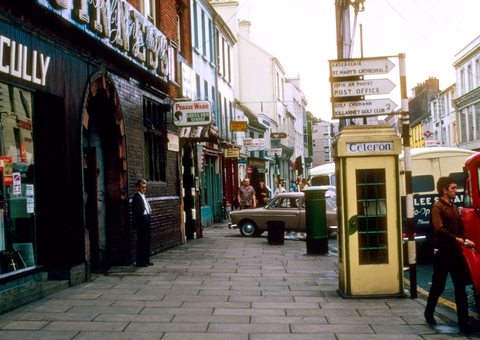Despite the cult that later developed around her, Mary the mother of Jesus doesn't get a very good showing in the gospels. Jesus tells stories and parables about fathers but not mothers. There's a widow. There's a little advice to Martha about the value of housework. But mothers? No. Mary might have been the sacred womb that carried him but he's not that interested in her afterwards.
In the Gospel of Matthew we're told that Jesus's mother and brothers come to see him preaching and want to speak to him: "Someone told him, 'Your mother and brothers are standing outside, wanting to speak to you.' He replied to him, 'Who is my mother, and who are my brothers?' Pointing to his disciples, he said, 'Here are my mother and my brothers'." Not the behaviour of a good Jewish son. At the wedding at Cana, where Jesus pulls his water-to-wine party trick, when Mary tries to talk to him Jesus replies brusquely: "Woman, what have I to do with thee?". Maybe they'd never really got on.
The tradition is, of course, that she knew his divinity from the start, and she remains still a potent figure in Christian myth and worship, but tradition is not text. When we go back to the gospels we find an irritable, not loving, relationship.
Colm Tóibín bravely takes this textual truth as his starting point for a gentle, thoughtful reimagining of Mary's own experience of her life in his new novella, The Testament of Mary. His Mary suspects her son is "out of his mind", just as the Gospel of Mark tells us Jesus's family did. She finds him frightening and distant. Though Tóibín mostly follows the Gospel stories faithfully, the gaps in Mary's narrative give him room to explore. His Mary is too fearful to stay at the foot of the cross when her life might be in danger; by the end of her life she's dabbling in idol-worship, having given up on the God she used to pray to.
The novel doesn't challenge Jesus's miracles but does present them as disquieting as much as glorious. The raising of Lazarus is given the beautiful, dark, muted edge with which a pre-Enlightenment mind would have experienced it. Yes, it happened. No, it's not clear that it was a good idea – like the returned corpse in The Monkey's Paw, the dead do often come back wrong: "Slowly, the figure dirtied with clay and covered in graveclothes wound around him began with great uncertainty to move … like some strange new creature jerking and wriggling towards life." Later we're told: "Lazarus, it was clear to me, was dying. If he had come back to life it was merely to say a last farewell to it. He recognised none of us, barely appeared able to lift the glass of water to his lips as he was handed small pieces of soaked bread by his sisters."
And no, even raising someone from the dead doesn't seem to be definitive proof of Jesus's divinity, either to Mary or to her friends. Of course not; in a culture where miracles are common, they also become commonplace. As post-Enlightenment readers, we can look at the raising of a single man – only one man seems a bit mean if he was the actual son of God – and think about comas, sickness that looks like death, the danger of premature burial in a desert culture where people are interred on the same day they die. Tóibín elegantly allows the space both for doubt and for belief.
The lowering presence of the disciples in Mary's story is particularly effective. They hover in the background of the book, pressing Mary to tell them the stories they want to hear, the ones that prove that this interesting, charismatic teacher and healer was something far more than that. By the end of her life she's afraid of them, knowing that it'll be easier for them to say what they want about Jesus once she's dead.
Since there are people who love to find reasons to take offence, The Testament of Mary might prove offensive for some. But, in fact, in places the book is almost too faithful to the Gospel text. Tóibín accepts without question, for example, the rather unlikely story that the temple priests were sufficiently influential among a general public who regularly rioted against them that they could force the crowd to call for Barabbas not Jesus during Pilate's version of "Judea's Got (Criminal) Talent": first prize pardon, second prize crucifixion. It's far more likely that, once he'd arrived in Jerusalem, a big city extremely accustomed to wandering preachers, Jesus just wasn't as popular as he'd been out in the sticks.
Such minor quibbles aside, though, The Testament of Mary is an important and persuasive book: Tóibín's weary Mary, sceptical and grudging, reads as far more true and real than the saintly perpetual virgin of legend. And Tóibín is a wonderful writer: as ever, his lyrical and moving prose is the real miracle.
Naomi Alderman's most recent novel is The Liars' Gospel (Viking)











